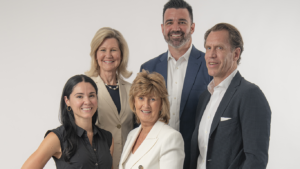For the uninitiated, the commercial real estate sector can seem byzantine considering all the strategic planning, coordination and timelines involved with successfully delivering a project to an end user. Both rookie and seasoned industry professionals must stay abreast of trends and develop a deeper understanding of how the sector works if they want to operate at the highest levels. To ensure the industry has the opportunity to grow these skills, NAIOP provides a suite of educational programming throughout the year.
“We often have three events a month about the business,” explains Cathy Teeter, managing director at CBRE and chair of NAIOP’s Education Committee. “The association’s member base is a deep well of expertise to draw from, so we try to spread that information out to everyone.”
Considering the varying work schedules of members, Teeter says these meetings may take place during breakfast, lunch or happy hour to have the broadest reach possible. For example, NAIOP recently hosted a lunch and learn focused on Arizona State University’s role in the state’s burgeoning semiconductor market — something Teeter says has appeal for people no matter what point they’re at in their career.
“We try to make sure our programming falls in our lane, but it’s not too hard to find topics that people need to hear about,” she continues. “Finding speakers in some places is a challenge, but people are generous with their time and knowledge here in the Valley. That’s what makes us unique — we have a welcoming and generous community that wants to make the industry better for everyone.”
Some of the learning opportunities are more technical in nature, diving deeper into cap rates or how common area charges are billed back to tenants. Others offer continuing education units so folks can keep their certifications up to date.
For members age 35 and under, Teeter says NAIOP’s Developing Leaders program helps young professionals establish a solid foundation for their careers. Participants attend skill-building seminars, social outings to build a peer network and have the chance to be mentored by industry veterans.
“Our organization is one where competitors can come and grow together,” she continues. “The truth is that we need each other to get deals done and learning with one another strengthens those bonds. Competitors sit side by side on committees, and having differing viewpoints makes sure our programming stays relevant and meaningful.”
DEEPER DIVE: Here’s where the residential real estate market stands in 2025
LOCAL NEWS: 100 best places to work and live in Arizona for 2025
INDUSTRY INSIGHTS: Want more news like this? Get our free newsletter here
Master of Real Estate Development
While NAIOP’s educational events provide valuable industry insights, they do not award credits towards an advanced degree. That said, the association has a relationship with ASU’s Master of Real Estate Development program for folks determined to grow their careers. Enrolled students are provided a NAIOP membership so they can begin engaging with the association — if they haven’t already.
“We believe it’s important to connect our students to the industry locally, nationally and globally,” explains Mark Stapp, executive director of the MRED program. “But we don’t just buy them a membership. We engage the association in multiple ways, including the Education Committee. Each semester, we conduct case studies where people from NAIOP come into the classroom to discuss a particular project in depth, that way students have a close-up look at how the industry operates.”
Stapp was originally part of the advisory group who helped ASU create this pathway and was later asked to lead it. At first, he didn’t intend to stay for long, but found the experience so personally and professionally rewarding that he still hasn’t left. Through his commitment to the industry, Stapp was also named a Distinguished Fellow by the national NAIOP organization — one of only 14 across the nation.
“Being recognized by one of the leading organizations in the industry means an awful lot, but it’s also an honor for ASU’s real estate programs to have a Distinguished Fellow as part of their leadership,” Stapp says. “It signifies credibility, and I’m able to network with top minds locally and nationally. That helps me identify resources we may need and get connected with them.”
The MRED coursework is targeted at mid-career professionals who want to develop a well-rounded understanding of the entire development spectrum. Students are placed into small cohorts so they progress through the degree track together, with an emphasis on experiential learning.
“All programs across the country teach essentially the same things we do, but what sets us apart is how we teach the concepts,” Stapp notes. “There are lectures, but students also have to take that knowledge and apply it to three real-world projects. We’re working with actual property owners to solve problems, and that’s the reason our learning outcomes are so bright.”
Stapp describes the relationship with the industry as a “two-way street” since employers benefit from the connections made with these highly motivated individuals. Each project students work on includes a review where they receive feedback from faculty, NAIOP members and participating firms. That way learners receive constructive criticism, and the wider commercial real estate community sees what students are capable of.
“The industry supports us because we are their farm team and employers know the quality of our students by engaging with us,” Stapp concludes. “Our objective is to produce the best talent possible, many of whom will go on to become leaders in the sector.”


